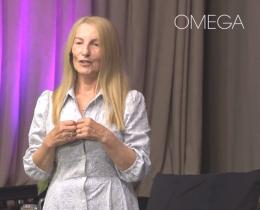My next-door neighbor has a big, affectionate, 125-pound Malamut named Barney and an eight-year-old granddaughter who adores him. One day, as Samantha was arriving to visit, I watched her run up to Barney to give him a hug. Barney responded exuberantly, licking her face profusely. He was simply greeting her with affection, but Samantha clearly wasn’t prepared for such rough-and-tumble love: she burst into tears.
As I witnessed Samantha’s distress, I immediately felt a sympathetic response in my own body, as you may have felt in yours—a rush of “Oh, no!” I went to comfort Samantha with a hug and a quick wipe of her face with my sweatshirt. Then I held a bewildered Barney at bay while Samantha’s mom came outside for a more thorough wash down with a wet washcloth and clean towel.
With her mom’s soothing words of “There, there,” Samantha quickly calmed down, wiped a tear from her cheek, then took her mom’s hand and walked over to Barney to start again.
Her mom showed her how to hold her hand out and let Barney lick that first. After that, they both patted the top of Barney’s head, then Samantha slowly moved toward Barney and gave him a hug. His tail wagged exuberantly, but there was no more face washing.
Coping Strategies That Help
As you may have noticed, Samantha learned several resilient coping strategies from her mom in this encounter with Barney. She learned that receiving support from others could help her calm down, and she learned how to approach the big dog in a confident, competent way that didn’t overexcite him. Her brain immediately encoded those lessons in her neural circuits for future reference.
Resilience, like all innate capacities in the brain, develops as the brain processes or learns from experience and translates or encodes that learning into its neural circuitry.
Because resilience is all about surviving and thriving, our brains begin to learn and encode lessons about coping strategies that keep us alive and safe from the very beginning of brain development. Some responses to “safe” and “dangerous” begin even in utero.
When our conditioning goes well, especially early in our lives, we build a solid neural foundation for resilience in the brain. The “rules” encoded in our neural circuitry allow us to respond skillfully and adaptively to the outer hiccups and hurricanes of our lives that trigger agitation or distress within.
The brain structures that perform the encoding are stable, yet flexible enough to learn new coping strategies. They buffer us against the effects of external stressors and traumas later in life. That’s true for many of us, much of the time.
When Conditioning Goes Awry
However, our conditioning—the wiring of our neural circuitry as we learn from experience—sometimes goes awry. When this happens, we can find ourselves stuck in negative, dysfunctional response patterns that leave us feeling ineffective and miserable and more vulnerable to stressors and traumas.
We may refrain from pushing back to assert our needs, watching someone else get the promotion we worked hard for. We may avoid opening the envelope from an insurance company or doctor, afraid of bad news, only to discover a month later that the enclosed letter was no big deal.
When encoded early enough in our development, these patterns can even derail the maturation of the brain itself.
With an understanding of how our brains develop, we can forgive ourselves for finding it hard to rewire those early coping strategies if they failed to become fully established, leaving us floundering in a “neural swamp,” or if they became rigid, leaving us stuck in “neural cement.”
When we know how to choose specific experiences to deliberately rewire our brains for better coping, we can fully recover our capacities for resilience and even strengthen the brain structures themselves that encode the new strategies.
Neuroscientists have proved irrefutably that you can teach an old dog new tricks; you can even heal the dog—or the brain—when necessary. Although the initial wiring of our brains is based on early experience, we know that later experiences, especially healthy relational ones, can undo or overwrite that early learning to help us to cope differently and more resiliently with anything, anything at all.



